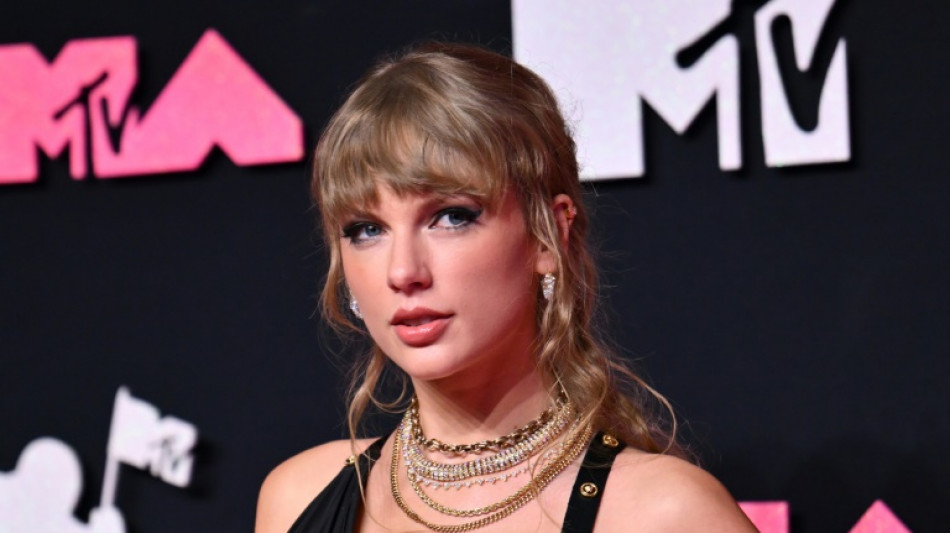
RBGPF
0.1600


A hubbub grips the class in the Belgian city of Ghent as university students eagerly discuss whether US pop star Taylor Swift is a "literary genius".
The question elicits passionate responses from students, and it's an exercise their professor hopes will enliven their engagement with more traditional figures of the English Literature canon.
The course is among a handful that have popped up at universities around the world as pop titan Swift has racked up hits and awards and as her Eras Tour is expected to set a record for the first billion-dollar tour.
"To read her lyrics without the context of the song, it can feel like poetry," one student says, after the teacher opens the floor to discussion.
Another student pipes up to suggest it's too soon to say Swift, 33, has had the same cultural impact as William Shakespeare, known around the world for many centuries. While Shakespeare wrote at least 38 plays, Swift has recorded 10 albums.
Some will wonder what Shakespeare and his peers share in common with today's biggest US singer-songwriter.
Well, they are all the subject of Elly McCausland's course called "Literature (Taylor's Version)" for Master's degree students at Ghent University, which will run until the end of the year.
During the first class on Monday, assistant professor McCausland piqued the students' curiosity with controversial questions, including why certain authors and literature are considered timeless, while other books are not valued the same way.
McCausland's goal? To make literature more accessible.
"I'd like to get people excited about literature, thinking about literature in a new way and realising that actually even literature from centuries and centuries ago still has something to add to our conversations," she told AFP at the class.
- 'Swift is a real poet' -
The 10-session course will use Swift's songs as references for themes and will focus on a series of historic texts including Charlotte Bronte's Villette, lesser known than Jane Eyre.
The course has proved popular, with 61 students signed up, twice as many as usual.
There are even students from other parts of Belgium.
Zina Ringoot, 20, had learned just hours before that she could attend the course and made the 90-minute trip to Ghent from Antwerp in the northeast.
"I'm a huge Taylor Swift fan," said Ringoot, an English literature Master's student.
"I'm hoping to write my thesis on Taylor Swift's album 'folklore' and how it connects to romanticism. So I thought I would get a lot out of this class."
Not everyone in the class is a Swiftie, as her fans call themselves.
Joris Verschelde, 21, admitted he was "not that big of a fan" but wanted to "see the connection between the songs and what what we already learned" in the older texts.
Laughter often fills the windowless auditorium, despite the fact that serious themes are on the agenda, including feminism, sexism and misogyny.
When McCausland asks: "Who are the gatekeepers" of English literature, one student quips: "A bunch of old men!"
Even if critics reject comparisons with the canonical greats, Swift has fans even among Shakespeare experts including British academic Sir Jonathan Bate.
After attending a concert during Swift's record-breaking Eras tour, Bate wrote in the Sunday Times in April: "I came away with confirmation of a thought I first had 15 years ago: this isn't just high-class showbiz, Taylor Swift is a real poet."
- Beyond Belgium -
University courses looking at Swift have been popping up around the world.
New York University's Clive Davis Institute launched its first-ever course on Swift last year, and Queen Mary University of London offered a summer school this year looking at Swift through a literary lens.
In Arizona, PhD student Alexandra Wormley is hosting a course on the social psychology of Swift at Arizona State University this autumn.
Critics online and even some media pundits have pondered just what it is about Swift that is so appealing.
For Clio Doyle, an academic who hosted the summer course at Queen Mary, "Swift is a really fascinating songwriter".
The lecturer in early modern literature added that another reason she looked at Swift was because of her popularity and the discussions surrounding her work.
"A course about Swift would be an opportunity for students both to deepen their readings of Swift's lyrics and to think about what it means to study something as literature," Doyle, who runs a similarly-themed podcast about Swift, told AFP.
The summer course will be offered again next year, and interest is not limited to the United States or Europe.
The University of Melbourne will host a three-day "Swiftposium" looking at Swift's cultural, economic and global impact in February 2024, the same month her tour arrives in Australia.
K.Tanaka--JT